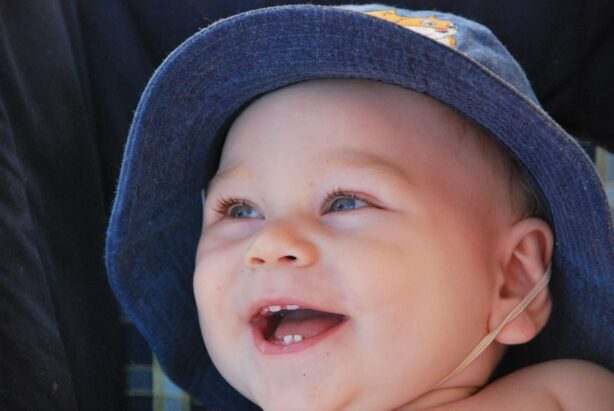Taking care of your baby’s teeth, especially if you’re a first-time mother, can seem like a daunting task!
Knowing when to start oral care, when to start brushing, and when to see a dentist isn’t always clear.

If you’re wondering about how to maintain your baby’s oral hygiene, keep these expert tips in mind to help ensure your little one’s teeth and gums stay healthy:
The Importance of Baby Teeth
While baby teeth are eventually replaced by permanent teeth, they are still important for many reasons.
According to this pediatric dentist, baby teeth are crucial not just for chewing food, but also for children’s speech development.
They also keep proper spacing in the mouth for adult teeth to grow in, and let your little one smile with confidence.
As your baby’s teeth start to come in, it’s important to start a proper oral care routine. This will help ensure that your baby’s teeth are healthy and strong.
Taking care of baby teeth now will help prevent problems like tooth decay and gum disease later on.
Follow these baby tooth care tips to ensure your little one’s teeth stay healthy:
- Get your baby used to oral care by wiping their gums with a clean, damp cloth once a day before their teeth come in.
- Start cleaning your baby’s teeth as soon as they erupt. You can use a soft, wet cloth or a finger brush designed for babies.
- Be sure to use only a tiny amount of toothpaste when brushing your baby’s teeth. Too much toothpaste can be harmful to their health.
- When your child is old enough, teach them the importance of spitting out toothpaste as they brush.
- Make sure to brush all surfaces of each tooth, including the front, back, and top. Use gentle circular motions and avoid scrubbing too hard.
- Twice a day is ideal for brushing, but if that’s not possible, just make sure you brush at least once a day.
In addition to brushing, you should also clean your baby’s tongue daily. You can do this with a tongue scraper or by gently wiping the tongue with a soft cloth.
Cleaning the tongue will help remove bacteria and food debris that can cause decay.
Why Oral Care is Important for Babies
While oral care is important for everyone, it can be especially crucial for babies.
Babies are born without the protective enamel layer on their teeth that adults have, which means that their teeth are more susceptible to decay and cavities.
If children do develop tooth decay, it can often result in baby teeth being removed, which can lead to problems with chewing and tooth spacing in the future.
Creating a routine of good oral care right off the bat will not only help prevent these issues, but also teach your little ones the importance of good oral health habits.
By taking the time now to develop these habits for your baby, you can ensure that they have healthy teeth and gums throughout their life.
What Foods are Good for Baby Teeth?
It’s no secret that what you eat can impact your teeth. The same goes for your baby.
Once your little one starts eating solid food, there are certain foods that can help promote healthy tooth development.
Here are some examples:
- Milk, Cheese, and Yogurt: Dairy products are rich in calcium, phosphorous, and casein, which help keep teeth strong. These minerals also neutralize the acids produced by plaque bacteria.
- Apples, Carrots, and Celery: High-fiber fruits and vegetables like apples, carrots, and celery help balance the sugars in the mouth. Their crunchiness also acts as a natural tooth cleaner by scrubbing the surface of teeth to help remove plaque.
- Water: Water is essential for all parts of the body, including the teeth. It helps rinse away food and debris, and aids in saliva production. Saliva is important because it contains enzymes that help break down food particles and protect against harmful bacteria.
Common Dental Problems in Babies
The most common (and unavoidable) dental problem babies experience is pain due to teething.
During teething, the gums may be sore and tender, and some babies may even experience diarrhea or a low-grade fever.
To help soothe your baby’s gums, give them something to chew on that is cool, such as a freezable teething ring or frozen washcloth. You can also massage their gums with your finger.
If your baby is having difficulty sleeping or is excessively drooling, contact your pediatrician.
Tooth decay can also be a common dental problems in babies. It occurs when bacteria in the mouth forms acids that attack the tooth enamel.
This can happen if a baby’s teeth are not cleaned properly, or if a baby frequently drinks sugary beverages.
Tooth decay can cause pain and infection, and may require treatment by a dentist.
When Should You Take Your Baby to the Dentist?
It’s important to take your baby to the dentist as soon as their first tooth appears, or by their first birthday, whichever comes first.
It’s never too early to start developing good oral hygiene habits, and the earlier you catch any problems, the better.
During your baby’s first dental visit, the dentist will check for signs of tooth decay and assess your child’s risk for future problems.
They will also give you baby tooth care advice, and answer any questions you may have.
After the initial visit, you should take your child to the dentist every 6 months for a check-up and cleaning.
Of course, if you have any concerns in between visits, it’s always a good idea to give your dentist a call and check in.
Tips for Preventing Tooth Decay in Babies
- Start cleaning your baby’s teeth as soon as they come through. Use a soft, child-sized toothbrush and water.
- Avoid giving little ones sugary food and drinks. This includes fruit juice, honey, and other sweetened liquids.
- Visit the dentist regularly for checkups and cleanings. This will help to catch any problems early and keep your baby’s smile healthy!

Baby tooth care is an important part of your child’s overall health and well-being. By following some simple oral health tips and starting a regular tooth care routine, you can be sure that your child will have healthy teeth for years to come.
Regular brushing and flossing, along with dental visits and a balanced diet, are all simple ways to help ensure your baby’s smile remains perfect for life.
